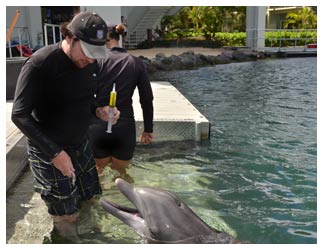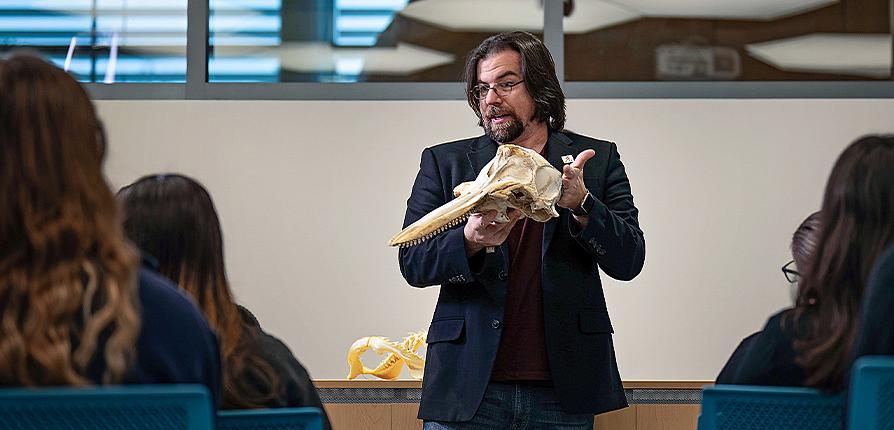Biology professor brings groundbreaking marine research to university
Story by Alyssa Faykus '19
Being the first person in the world to know a fact is just a perk of the job for Dr. Jason Bruck, assistant professor of biology at SFA, who researches one of the most intelligent mammals in the world.
Last year, Bruck published a study on how dolphins use taste and signature whistles to identify each other. He conducted much of his research at Dolphin Quest locations in Bermuda and Hawaii at both Oahu and Big Island. These facilities support vital marine mammal conservation, education and scientific study.
Though Bruck has already published the results of this research, he's just getting started with understanding the multifaceted communication style of these mammals.
"Dolphins are one of the hardest animals in the world to study." Bruck said. "This animal is smart enough to where you have to keep them entertained or they will swim off and do something else with their time. They are hard to see, hard to tell apart, they live in remote places — they are very hard to work with, but I enjoy those challenges."
Career planning at age 3
Even at a young age, Bruck knew he was destined to have a career that involved dolphins. His father was a veterinarian, and his family all worked together in animal rehabilitation in upstate New York.
"When I was about 3 years old, my parents made it clear to me that I would need to get a job someday," Bruck said. "I asked them to give me some options, and what I settled on was a whale and dolphin doctor. That's where the genesis of this all came from — from a little kid who thought whales and dolphins made sense because they were big and cool."
Later in his life, Bruck became more interested in the behavior and study of dolphins than simply "putting them back together as a doctor," he said. "I was drawn to their communication, how they think, how they behave."
Luckily, life went exactly that way — now, Bruck is a researcher who studies dolphin behavior. His early research focused on interspecies interactions with hybrid dolphins and evolved into his current focus of dolphins' signature whistles, as well as conservation projects related to drone development.
Communicating with whistles
Just as humans have names, each dolphin has a unique whistle. Dolphins name themselves within the first year of life and keep that signature whistle their whole lives.
"When a dolphin gets lost in a group, instead of calling out to the group, they will call their own name, and that's how the other dolphins will know they are lost and who is lost. They can copy each other's whistles and address other dolphins," Bruck said.
Bruck's curiosity to understand how dolphins communicate and think goes hand in hand with his education, which he said was split between psychology and biology. His undergraduate studies at Southampton College of Long Island University were in psychobiology, and his master's and doctoral studies were in the behavioral biology cluster of the Department of Comparative Human Development at the University of Chicago.

"Because I work in a multidisciplinary sense, I'm a jack of all trades but a master of few," Bruck said. "I always tell my students to be the person who can see the connections between the disciplines because then you get to be the first author of the paper that puts a lot of smart people on a team together."
Being able to see those connections is a large part of what drives his dolphin research. Humans and dolphins are separated by about 90 million years of evolution, yet they share many characteristics of intelligence.
"Dolphins can remember other dolphins' signature whistles for more than 20 years," Bruck said. "A dolphin lives in a society very similar to ours in that you have different kinds of social groups that are all contingent on the types of social relationships. They have a fission-fusion social system, which is the same as what humans have. When you have that kind of social system, you get smart over evolutionary time — or at least smart in a way that we understand."
While Bruck's memory research was considered groundbreaking, one challenge remained: how does someone determine if a dolphin is remembering a signature whistle because they know the dolphin it belongs to or just remembering that whistle as a familiar sound?
"Part of the way we figured out the whistles are representational — meaning when a dolphin hears a signature whistle, it elicits a mental picture of the whistle's owner in the listener's head — is by doing a cross-modal experiment," he said. "We paired the whistle with another aspect of the dolphin's identity that can't change. In the case of a human, it might be a face. We don't know if dolphins can tell each other apart visually, but maybe we could rely on another sense."
The question remained: What else do dolphins use to identify each other?
Cross-modal experiments lead to new discovery
In the 1994 book titled "The Hawaiian Spinner Dolphin," considered the first comprehensive scientific natural history of a dolphin species ever written, researcher and co-author Ken Norris shared an observation he'd make when he'd stand at the front of his boat and glance down at the water.
"The dolphin would swim up and urinate or defecate, and the next dolphin would come, open its mouth and take a taste. That's interesting, right?" Bruck chuckled. "It turns out, dolphins don't have a sense of smell. The only way they could identify each other through chemical perception is with taste."
Bruck confirmed with colleagues that dolphins are the only known vertebrate to have gustatory — or taste-based — social recognition. The logic behind this discovery was that if dolphins could identify others by urine then they should be able to tell their familiar social partners apart from other dolphins.
Bruck and colleagues then paired the signature whistles to the urine cues and observed that the dolphins would get excited if the urine cue matched the signature whistle. If the urine cue did not match the signature whistle, the dolphin was more likely to ignore it. If a dolphin was given just the urine of another dolphin, it would sometimes whistle the signature whistle of the dolphin to which the urine belonged.
All of this served as evidence that dolphins, like humans, have a representational understanding of their individualized identity signals.
"Physiologically, they are very different in many ways; but cognitively, they share a lot of similarities with us," Bruck said. "The study of biology is the study of ourselves in the most comprehensive way possible. I think the struggle occurs when we don't tie these animal studies back to ourselves and how we work in the world, then it becomes less relatable and harder for people to understand. Making those connections can make biology relevant to everybody, even when we are embracing the diversity of life on this planet."
Bruck has no end goal in sight with his dolphin research. As more questions are asked about these mammals, more research will be done by him and his lab.
"From the research point of view, I get to be the first person in the world to know a fact," Bruck said. "There's nothing cooler than that because you are discovering things that are going to be part of society's shared knowledge of the world, and that outlives me."
 Axe ’Em, Jacks!
Axe ’Em, Jacks!
